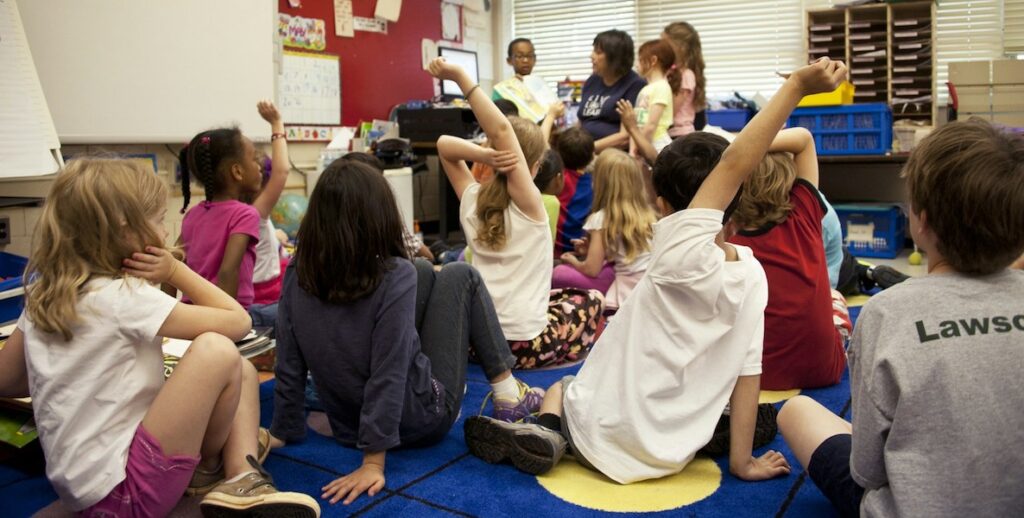My son started pre-K last September. I had left the workforce after he was born and then went through the same hand-wringing period that parents of young children all too often go through. His early daycare was a hodgepodge of centers as I took preschool teaching jobs that came with a discount that reduced our family’s childcare costs. Even so, our financial situation was tenuous and unsustainable to build for future savings.
When we found what would eventually become his preschool, it felt a little like winning the Parenting Triple Crown: The center was close to home, affordable and offered the social, emotional and academic programming we wanted. My son did not handle the transition as well as his parents. He was clingy, sad and would cry as we rounded the corner and the school came into view. Drop-offs dragged on as he asked for one more hug. Our perfect pre-K felt more dire by the week, but one aspect finally turned the tide: his teacher.
According to the National Association for the Education of Young Children (NAEYC), a high quality teacher can accelerate learning and skill development in the preschool environment, which is certainly true in our case. My son’s teacher, Ms. Yullissa, created an inclusive, child-centered classroom, providing structure and security — essential elements for him to feel safe and thrive. A morning routine was developed; she helped him foster friendships. Soon he looked forward to school. Most mornings now he runs into the classroom and often forgets to say goodbye due to the teacher’s level of care and expertise. She did this not just for my child, but the 19 others in class with him.
Despite all the hard work that goes into early childhood education (ECE) and the clear positive effect on children and our economy (every dollar invested in early education sees a return of $4 to $9), the average ECE teacher like Ms. Yullissa makes only $12.43 an hour, leaving nearly one in five of them living in poverty. Early childhood educators cannot pour from an empty cup; they deserve a family-thriving wage as they care for Pennsylvania’s youngest learners.
Governor Shapiro’s 2024-2025 budget proposed $30 million in new state funding for pre-K, which is a strong start. However, the diverse ECE advocacy groups across the Commonwealth that have come together to create Early Learning PA suggest an investment of $284 million in state funding is necessary for recruitment and retention programs to alleviate the staffing crisis facing early learning centers across PA. An estimated 7,817 teachers are needed to serve eligible children ages 3 and 4. This money would be directed to centers already in subsidy agreements with the state and would be restricted to initiatives like monthly wage increases, hiring bonuses, benefit packages and retention bonuses. This grant funding will help to legitimize the early childhood education field, stabilize the workforce and incentivize teachers to join the field who otherwise may not have seen it as economically viable.
High-quality educators make all the difference in early childhood programs — it’s more than just play; they lay the groundwork for lifelong success socially, emotionally and academically. PA voters agree, as 98 percent say early childhood education is important and 78 percent believe state funding should be invested to increase early childhood educator pay.
In my son’s classroom, I’ve watched as Ms. Yullissa quietly redirected behavior and connected with tired, uneasy children, effortlessly transitioning them to the classroom at drop-off. She consistently helps children resolve conflicts and empowers them to take on classroom responsibility. I also know all the invisible work she does in addition to running her classroom: cleaning the room, serving meals, bandaging boo boos, documenting development, taking out the trash, connecting with families, completing required professional development, mentoring novice teachers, documenting children’s developmental growth and being the emotional backstop for young learners as they develop, explore and grow.
It’s time to make our voices heard so teachers like Ms. Yullissa, and thousands more across Pennsylvania, stay in the field. State legislators are currently negotiating Governor Shapiro’s budget, so contact your legislator and let them know you support and insist on the budget, including the additional $284 million for early childhood educator recruitment and retainment. We must take care of early childhood educators, while they expertly care for our youngest learners.
Lyssa Horvath is a former pre-K and Head Start teacher in Philadelphia. She is a 2023-2024 Teach Plus Pennsylvania Senior Policy Fellow.
The Citizen welcomes guest commentary from community members who represent that it is their own work and their own opinion based on true facts that they know firsthand.

